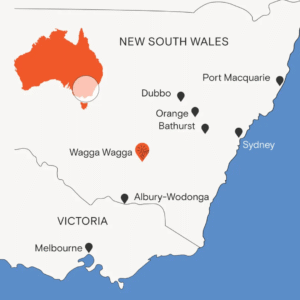Grow Your Career in Agriculture with Charles Sturt University in Regional Australia
We’re proud to cooperate with Charles Sturt University, a leader in agricultural education, located in the heart of regional Australia. Their BACHELOR OF AGRICULTURE programs provide practical skills, innovative knowledge, and hands-on experience to prepare you for a successful career in the dynamic agricultural industry.
Explore Australian qualifications in farm management, agribusiness, and sustainable agriculture while enjoying the unique opportunities of studying in regional Australia. Gain real-world experience, connect with industry experts, and open doors to local and global career opportunities.
Bachelor of Agricultural Business Management
Bachelor of Agricultural Science
Bachelor of Agriculture
Bachelor of Animal Science
Bachelor of Equine Science (with specialisation)
Bachelor of Veterinary Biology / Bachelor of Veterinary Science
Master of Agricultural Science (with specialisations)
Master of Agriculture (with specialisations)
Bachelor of Engineering (civil, electrical or mechanical engineering). Australia's only four-year Bachelor of Engineering with 2 years of PAID cadetship!
ACCESS AUSTRALIA'S BEST AGRICULTURAL FACILITIES IN WAGGA WAGGA
Located in the heart of Australia's major agricultural region, Charles Sturt University's 1,600-hectare Global Digital Farm features horticulture, livestock and cropping enterprises managed to industries' best practice. You'll have access to extensive facilities, including the most sophisticated underground root growth laboratory in the southern hemisphere. The facility also offer five state-of-the-art laboratories and modern glasshouse facilities, and working models of a range of irrigation systems.

ACCOMODATION
If you’re thinking about living on campus, Charles Sturt University has a variety of accommodation options available, including classic dorm-style to ensuite rooms with shared common areas and facilities. Their accommodation options are comfortable, safe and secure.
Rooms are fully furnished and all costs, such as internet access, are included so there are no extra bills to worry about.
ELIGIBILITY TO APPLY FOR A SUBCLASS 500 STUDENT VISA
For a student visa, an applicant must be enrolled in a course of study that is registered on the Commonwealth Register of Institutions and courses for Overseas for Overseas Students (CRICOS).
If you are applying from outside Australia, you must include a Confirmation of Enrolment (CoE) for each intended course of study with your visa application.
At the time of this visa application, you and your family members must have and maintain adequate health insurance, Overseas Student Health Cover (OSHC), for the period of intended stay in Australia.
You might be required to provide evidence of English language proficiency while the visa application being processed unless exempt.
In addition, a primary applicant needs to have access to sufficient funds to cover travel expenses, living costs and expenses, tuition fees as well as costs required for any dependents included in the application. Current standard of annual living costs for those who intends to stay in Australia for a period of 12 months or more is AUD 29,710, and AUD 10,394 for a spouse or de facto partner, and AUD 4,449 for a dependent child. The accurate amount of financial support will be calculated case by case as per the requirement prescribed by the Department of Home Affairs.
Eligible visa 500 holders can work up to part-time (48 hours every 2 weeks) during their course of study or training is in session, and full-time during school holidays. With your initial visa, you can only commence work once your course has commenced (an exception is that if your student visa was granted in relation to a master’s degree by research or doctoral degree, you can work with no restriction after course commencement).
BENEFITS OF STUDYING IN A REGIONAL AREA
- High quality education
Smaller cities are home to high-quality Australian colleges that often excel in specialised areas of study.
Smaller cities also offer study opportunities in and near diverse ecosystems, natural environments and large industries. This allows you to gain expert knowledge in niche study areas.
When you study in a smaller city (or ‘regional’ location), there are often smaller class sizes. This can mean it’s easier to meet new people, access support services and seek extra help with your studies.
- Employment opportunities
Many smaller Australian cities may offer great employment opportunities during and after your studies. With lower competition for jobs, compared to big cities, you may find it easier to secure part-time work or internships related to your field of study.
- Opportunities for Migration
Studying in regional Australia has other migration opportunities that would not necessarily be available if you studied in a major city. Priority visa processing times and access to the Regional Occupational List are among the regional area incentives. As a result, regional students have access to more visa opportunities to live and work in Australia than non-regional students.
- Affordable living
Compared to major cities, the cost of living in smaller cities can be more manageable. From accommodation to daily expenses, you may be able to find a smaller city that helps your budget stretch a little further.
- Nature and adventure
When you study in a smaller student city, you often get to immerse yourself in beautiful natural surroundings on campus. You’ll also get to spend your free time on outdoor adventures and discovering beautiful landscapes and native wildlife. Whether you’re drawn to the tropical beaches of Queensland, the serene landscapes of Tasmania or an outback adventure in the Northern Territory, regional Australia offers something for everyone.
- Strong community connections
Living in a smaller city gives you the chance to connect more deeply with the local community. You’ll find many opportunities to get to know people on and off campus.
